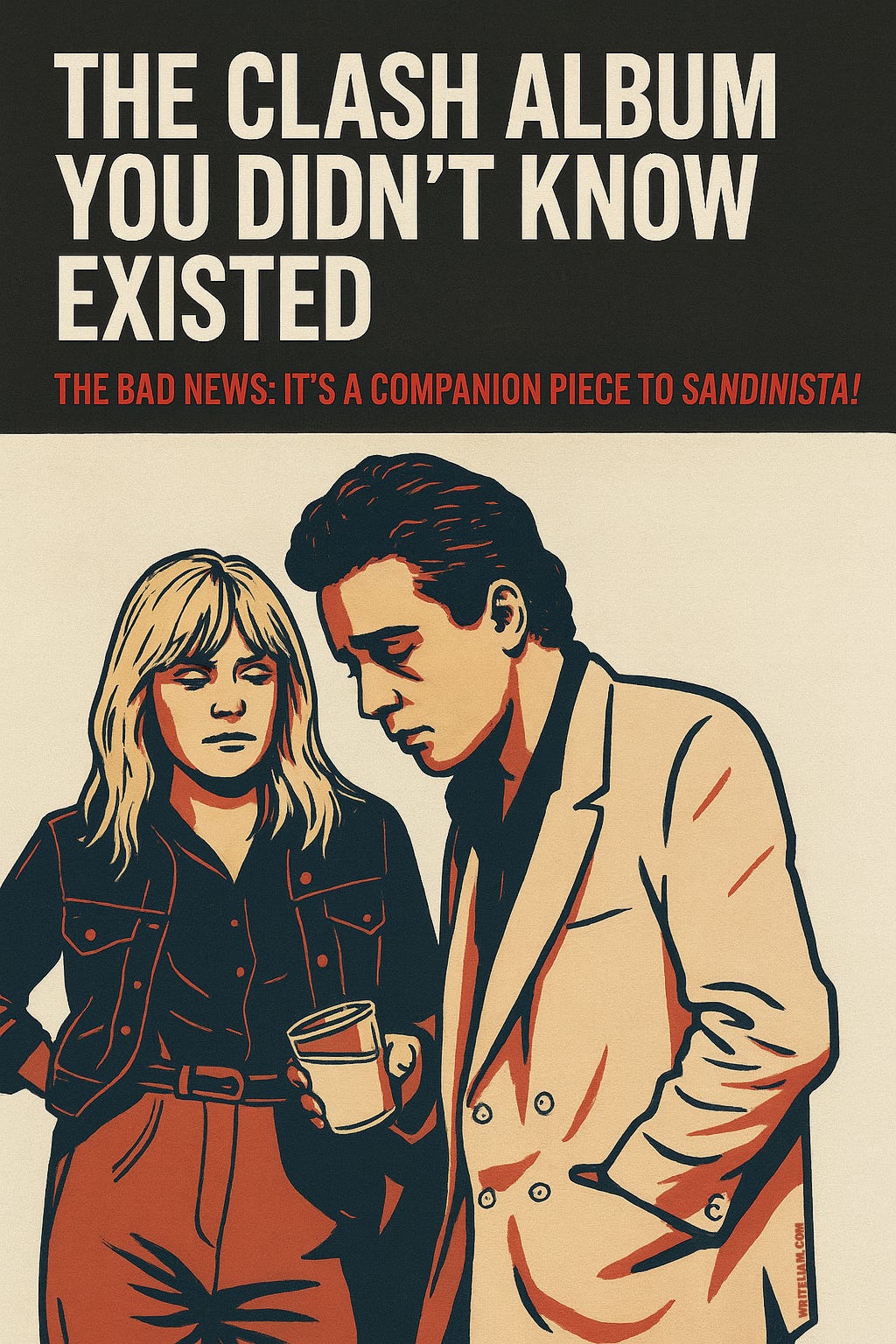The B-Side: The Clash album you didn’t know existed
The bad news: It’s a companion piece to 'Sandinista!'
Ellen Foley has one of those classic show business stories that reminds one of a moth – always circling the spotlight, dipping in and out of the glare and casting its shadow, but somehow never quite landing.
Her biggest moment was as Meat Loaf’s duet partner for “Paradise by the Dashboard Light,” singing the classic “Will you love me forever?” call to his “Let me sleep on it” response. If you’ve seen the video – that’s not her. That’s another performer, Karla DeVito, lip-synching to Foley’s part.
As an actor, she appeared in the Broadway hit Hair. She spent a year starring on Night Court, only to be replaced by Markie Post. And she fronted a Clash album you’ve never heard of.
In 1981, The Clash had fully earned their self-anointed PR title, “The Only Band That Matters.” Starting in 1977, they had released a string of bangers that straddled multiple genres while maintaining a consistent moral and political point of view. I can be forgiven for not knowing for a long time that “Police and Thieves,” a standout track from their first album The Clash (which was filled with quite a few), was a cover of a reggae tune by Jamaican star Junior Murvin.
As filtered through the combination songwriting voice of Joe Strummer and Mick Jones, Murvin’s police corruption lament stands alongside the Clash’s album full of madames, junkies, Black revolutionaries, American-backed juntas, and the desperate working class. While The Clash are classified as a punk band, they never let the genre define them, and by the time they began recording 1980’s Sandinista! they had gained the credibility to record a genre-spanning triple album—if not always the ability.
From the tight bassline and locked-in groove that “The Magnificent Seven” borrowed from funk via early hip-hop sampling, all the way through the dub/rockabilly combo of “One More Time” and the calypso—yes, I said calypso, and no, I did not say it was good—of “Let’s Go Crazy,” the band—backed by members of Ian Dury and the Blockheads, as well as some real-deal reggae musicians— delivered a 36-song stretch across genres while practically guaranteeing that absolutely no one would be pleased by the entire result.
Anyone who tells you they love Sandinista! beginning to end is either fucking with you, a liar, or insane. And that’s okay.
At the time, Mick Jones was in a long-term relationship with Ellen Foley, the tempestuousness of which inspired one of the band’s greatest hits, “Should I Stay or Should I Go?” So after they finished recording Sandinista!, The Clash used the same studio, the same engineers, and a lot of the same backing musicians to record 1981’s Mick Jones-produced The Spirit of St. Louis, a twelve-track sprawling mess of an album that included the adventurous spirit of Sandinista!’s genre-hopping, with half of its tracks written by Strummer/Jones themselves.
And some of those songs are quite good! If not quite equal to the dizzying heights of anything found on London Calling, or the restrained righteous anger of “Straight to Hell,” or the pure wonderful poetic weirdness of their Allen Ginsberg collaboration “Ghetto Defendant,” their lyrics deliver unmistakable Strummer/Jones heat:
“Fingers to the bone for the sake of the home till the wind blows it all away
Beauty in shrouds like fast moving clouds
I live my time in a Theatre of Cruelty”
This is from a song called “Theatre of Cruelty” that marks the midpoint of Spirit of St. Louis. Like Sandinista!, this is an album designed to thoroughly please no one, with its blend of theatrical cabaret influences and the post-punk edge of The Clash in 1981. It opens side 2 of the LP, with side 1 ending with the Edith Piaf lament “Mon légionnaire.”
For the working-class punk rockers looking for the Clash of “Career Opportunities,” or the obsessive Meat Loaf fan, it was guaranteed to disappoint. In fact, try selling a Clash fan on an album by describing it as “Brechtian.” There’s some areas of Europe where you might walk away with a broken nose.
And yet – a rock outfit like The Clash, known for their super tight studio work, backing a powerhouse like Ellen Foley whose strength lies in never holding back guarantees a push-pull energy that might baffle but never bore.
The Spirit of St. Louis charted in Europe because of course it did, but it was just too weird for American audiences that notoriously like their genres categorized and kept separate – there’s no room for punk rock cabaret except in the record collections of the most avant and adventurous.
So listen to it. Not reverently—casually. In the car. While folding laundry. Let it creep in sideways, the way weird art sometimes does. If Sandinista! was The Clash’s mad, glorious thesis, then The Spirit of St. Louis is the footnote scribbled in the margins—half-baked, mostly forgotten, and all the more interesting for it.
You can listen to the entire album on Spotify below. And if you enjoyed this post, please consider sharing it or even subscribing to this Substack here.
This essay is only about the 12-track version of The Spirit of St. Louis, and the Spotify version linked above, you might notice, runs an extra three tracks. The song ‘Black Boys’ - it’s from the musical Hair and was considered incredibly progressive sixty years ago.
If you like the graphic above, you can buy it on a shirt right here. The money goes to support the blog and the artist. Thank you.



This is a good read. Well written. You’re no Carlos Danger but not bad.